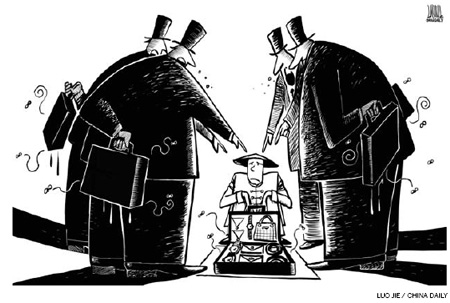Op-Ed Contributors
Counterfeit market blues
By Han Qi (China Daily)
Updated: 2010-07-03 07:56
 |
Large Medium Small |
The demand for counterfeits has always been strong, because an overwhelming majority of consumers cannot afford to buy genuine brand products. So, consumers with a strong desire to possess a brand product but without the money to buy it shift their attention to fakes - which obviously cost many times less. More importantly, most ordinary consumers care more about brand names than the quality of the products, which they feel are not necessarily inferior to the real stuff. They could be right because the development of science and technology has made it easier for people to copy a brand product to the smallest detail and sell them at a lot cheaper price.
A Kelkoo survey, which covered 710 people from May 10 to June 2, shows 16 percent of the people would buy fake products and 8 percent recognized they had already bought some.
It is unrealistic to expect all fake-product consumers to feel guilty. So the demand for counterfeits is not likely to fall. And as long as there is demand, fake products will continue to be made and sold.
Contrary to the popular notion in the West, Chinese enterprises don't hold a patent in making fakes. Counterfeits are made in the US, the UK, France, Japan and other developed countries too.
Fakes existed long before China became the "world factory". Newly industrialized countries and regions underwent the same experience as China is going through now. And even if $4.51 billion worth of made-in-China fake products were sold in Europe last year, the amount is only 1.9 percent of China's $236.3 billion exports to EU countries.
The reform and opening up of the past three decades have thrown up some questions for China such as how to better cultivate the market and strengthen management. And the government has never turned a blind eye to the nuisance of fake products. Authorities at various levels consider cracking down on making and selling fake and substandard goods a very important part of their job. Wang Hai, famous for his commitment to rooting out fake products, is the best example of the thousands of officials who want to free society of fakes.
As a manufacturing power, China is well aware that no made-in-China products should be a counterfeit or imitation. But it is unfair and unscientific to believe that a handful of people making fake and substandard products represent China's entire exports sector.
Before blaming China for supplying fakes, European countries should review their monitoring systems to find out how they allow fake products to be manufactured and sold in their markets. Since the EU has already acknowledged the urgency of cracking down on fake products, it should take all necessary steps to increase the efficiency of its monitoring officials instead of blaming China for the problem.
The author is a professor at the University of International Business and Economics.

(China Daily 07/03/2010 page5)